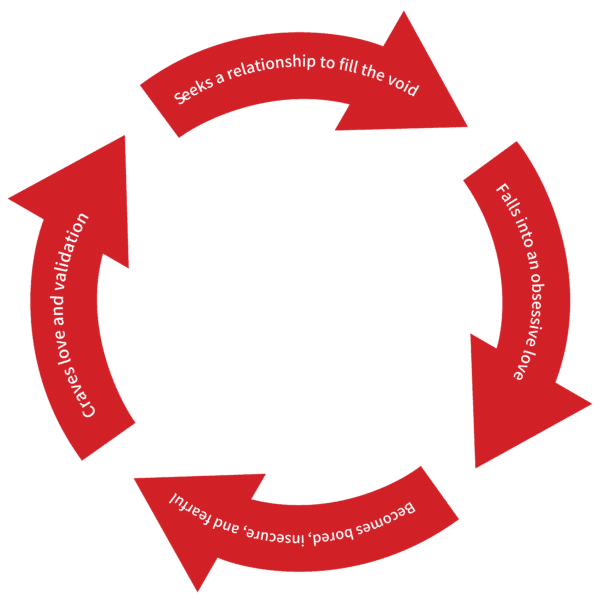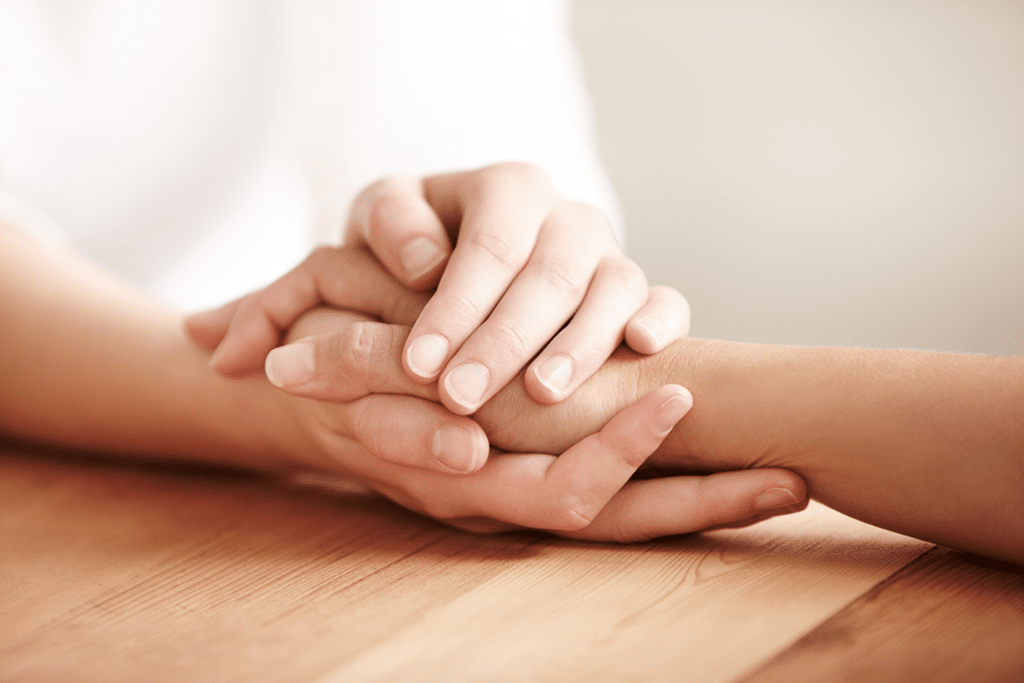Love addiction, a term which we call attachment dysregulation, can cause apprehension and insecurity in romantic relationships. Love addiction can be heartbreaking, dysregulating, and just plain exhausting, both for the person struggling with love addiction and for their loved ones. Fortunately, with targeted intervention from an experienced relationship coach, love addiction can be overcome.
Here is our guide to navigating the rocky waters of love addiction. With the right support, healing and healthy relationships are always possible.
Table of Contents
What Is Love Addiction, Really?
Understanding the Love Addiction Cycle

What Is Love Addiction, Really?
Destabilizing patterns of behavior
A preoccupation with romantic partners
An inability to be single
Love addiction, also referred to as pathological love, is a behavioral pattern characterized by an overwhelming and unhealthy preoccupation with romantic partners. This excessive interest often leads to a lack of control, obsessive thoughts and behaviors, and a driving need to have attention, validation, and reassurance from another person.
Love addiction is about a deep, unmet longing that drives people to desire a relationship to make the pain go away. In this respect, love addiction is similar to other addictions since it involves obsession, cravings, and withdrawal.
Also, like drug addiction, people struggling with love addiction often struggle to achieve satisfaction. There is never enough. And, like drug addiction, many people who are told they have a love addiction KNOW they want things to be different but feel unable to stop the behavioral cycles they find themselves in. People who are stuck in these patterns often need a relationship coach to help them break the cycle.

What Causes Love Addiction?
Insecure attachments
Withdrawal from love
Core wounds
Early childhood relationships are the first place to look to understand how love addiction forms. Love addiction is a response to relational damage caused by early unmet needs.
As adults work through the causes of their love addiction, they often realize that issues in their relationships relate back to their childhood experiences. They’re drawn to what’s familiar, regardless of merit. This means they can be drawn to people who cause them pain repeatedly, even if they don’t mean to be.
People often find themselves inexplicably recreating the painful experiences they endured when they were young. This normally happens unconsciously and unhealthy patterns may be passed downfrom one family generation to the next. It takes careful, intentional work to change these patterns.
Love addiction can be a way of coping with emotional distress, pain, or fear and can provide a temporary sense of fulfillment or pleasure. The relief experienced often feels like well-being, but it usually doesn’t last. Dysfunctional attempts to heal inner pain from an outside source often perpetuate cycles of pathological love.
An Insecure Attachment
Love addiction and attachment disorders can develop when individuals try to fill the void left by a significant emotional or psychological childhood wound. When children do not receive the emotional nurturing and healthy attachment they need from caregivers during their formative years, they may develop an insecure attachment style that makes them more prone to the problematic feelings and behaviors of love addiction. This frequently looks like anxious attachment in adulthood.
The origins of anxious attachment could be from a parent who was frequently gone, who couldn’t stay connected, or who had their own wound and couldn’t nurture their child. Losing a parent at a young age, divorced parents, or having a parent who wasn’t a stable presence are often triggers for love addiction later in life. Any shift in caregiving that feels unsafe or confusing, such as foster care or changing homes among relatives, can cause people to feel insecure in their attachments.
Circumstances like these, and others, can lead to an adult life spent craving attention and reassurance. There is a longing for connection and security, but when it happens, it’s coated in fear and worry – what if it goes away? What if I’m not enough? What if I do something wrong? How can I be sure they won’t leave?
People with love addiction tend to resonate with the term “attachment disorder” upon looking at the emotional challenges of neglect and abandonment they experienced in their childhood. Because their deep unmet longing is hard to tolerate, the individual is often left feeling lifeless and empty. They spend years, sometimes a lifetime, trying to repair childhood longing through their partners. Attempt after attempt leaves the sufferer baffled, as romantic partners and romantic love fail to quench their cravings and meet their expectations.
Sometimes other diagnoses may have been given by a licensed therapist or other mental health professional. For example, substance addictions, depression, anxiety, personality disorders, or trauma diagnoses can be co-occurring. These additional diagnoses can be underlying or the unintended result of the dysfunctional attempts to soothe the pain of living with the original emotional wound: the attachment injury.
Withdrawal
Most love addicts who are unable to end a relationship will try to “fix” it and prove to themselves that they are “worth the love they are fighting for.” For them, “winning” often means their romantic partner stays with them and that the intimate relationship continues, regardless of the quality. They do not have a solid sense of self-worth outside of a relationship, so they may protect it to the point of their own self-detriment.
They are found in a highly destabilized position when abandoned, often unable to function at work or in social circumstances because of a withdrawal from love. The pain of real or perceived rejection and abandonment feels intolerable. And once the addictive rush of the honeymoon phase is over, perceived rejection and abandonment are visible everywhere.
It’s very hard in attachment withdrawal to see that there are healthier ways to engage in relationships. At this point, a person may likely feel desperate and unworthy. Their self-esteem is plunging, and often, the belief is that only the attention of a romantic partner can help. This is true withdrawal.
Love Addict Core Wounds
If someone has experienced any of the following and has not taken the time to heal their wounds, they are likely to be susceptible to what some call “love addiction”:
- Parents got divorced when they were young
- One or both parents had untreated mental illness
- They were adopted
- They lost a sibling or parent at a young age
- They were abused
- Their parents were emotionally unavailable
- They were neglected
- They were abandoned
- They didn’t get validation from their parents
These experiences drive the need to want either overly dramatic and intense emotions in relationships or detach completely for fear of neglect and abandonment. Both compromise the ability to have healthy, secure attachments.
In either case, the result is a disconnected and unhealthy relationship.It’s important to note that love addiction can have multiple causes, and each person’s experience is unique. Understanding the underlying causes of love addiction is an important step toward recovery and developing healthy coping mechanisms.
Understanding the Love Addiction Cycle

Unfortunately, “love addicts” usually pick a love-avoidant person to partner with, which triggers an unhealthy cycle, because the love-avoidant person is terrified to have anyone get too close, so they push their partner away. People with love addictions are not satisfied by love-avoidant types, but they are normally drawn to them because the dynamic is familiar. Love addicts live in a chaotic world. They are fearful of being alone or rejected, so they endlessly search for that special someone to make them feel whole.
They become attracted to the intense experience of “falling in love” instead of wanting the peace of healthy relationships. Once a relationship has grown comfortable, they can mistake stability for boredom – OR they can become terrified that their partner has become bored or disinterested. Once the intensity of falling in love has simmered down, worry often follows because relational normalcy feels unfamiliar. They have a very hard time learning to experience feelings like contentment and relational safety.
Their life choices become focused on the search for this perfect relationship. This search for immature love leaves a person in constant consideration of what their partner wants. They live in the hope of finding the one person who will fill their inner void, and their expectations in relationships are often unrealistic.Furthermore, people with love addiction struggle with setting boundaries and communicating their needs in a relationship. They may prioritize their partner’s needs and wants over their own, which can lead to feelings of resentment in the relationship. Relationship coaching can help break this toxic cycle.

Love Addiction Symptoms
Fears of abandonment
Cravings for attention and romantic validation
Chaotic, unstable relationships
| What Does Love Addiction Look Like? | |
| Feeling | Behaviors |
| Anxiety |
|
| Sadness |
|
| Instability |
|
| Neediness |
|
| Obsessiveness |
|
| Anger |
|
It’s important to note that each person’s experience with love addiction may be different, and not all individuals will exhibit all of these signs and symptoms.

Facing Love Addiction Head-On
You aren’t stuck.
You aren’t alone.
Healing is possible.
Love addiction is not a fixed way of being. It’s the result of heart pain and brain processes that can be healed with loving care and skilled attention.
Since these behavioral patterns often begin with unmet needs in childhood, the resulting wounds and attachment injuries follow into adult relationships. For many people, it’s a do-over-and-over-and-over because the reward system of the romantic relationships created are never able to provide the deep healing needed to soothe those early wounds and painful messages.
Just because someone comes from a dysfunctional family doesn’t mean they can’t create secure attachments and have healthy relationships. Even if they’ve had a traumatic childhood or experienced a devastating or unhealthy relationship, they can still heal. Believe it or not, everybody is capable of that… and, importantly, everybody is worthy of that.

Break the Pattern of Love Addiction With a PIVOT Workshop
If you are struggling with love addiction, you aren’t alone. And you are already taking steps towards healing by reading this and researching love addiction. It isn’t easy to face pain and take an honest look at yourself, but remember, you are capable of happiness, love, and a healthy relationship.
If you are looking to overcome love addiction, then contact PIVOT. Our team provides evidence-based methods to support your journey toward healing. At PIVOT, we are committed to the sincere belief that ANYBODY can experience the relational satisfaction, inner peace, and profound freedom that comes with healing those early attachment injuries and disconnecting from the survival patterns of love addiction. We’ve seen success again and again.
Our specialized relationship coaching and love addiction retreat gives you sequenced action steps for behavioral change. We can help you get on the right track toward a healthy and happy relationship. Call us today at 1-855-452-0707 to begin the journey.
